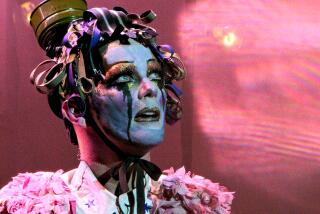A ‘60s ‘Face’ on ‘90s Concerns
- Share via
In “The Man Without a Face,” a secret friendship between a troubled boy and his tutor, an older, disfigured man (Mel Gibson), is threatened by small-town authorities who suspect molestation. (Rated PG-13)
*
Unusually moved by its serious themes, kids found much in this film that spoke directly to them.
Although the story is set in the ‘60s in a seaside village in Maine, its characters--a blended, re-blended and bickering family--and its subject of child abuse--ring all too true for many kids of the ‘90s.
Many of them especially sympathized with the falsely accused Gibson, relating his fictional plight to that of rock star Michael Jackson, recently caught in a swirl of child molestation accusations. Moreover, they applauded the film’s underlying message, namely, that kids need more adults who love and pay attention to them (even if they seem strange to others) and fewer impersonal laws and rules that they say overprotect them.
“I’ve never seen a movie like that,” Sarah, 12, said. “It was really touching. It was really sad. He never got to see him again until his graduation.”
“It was really good,” said her friend Natalie, 12. “I liked the acting a lot. I never really noticed acting before,” she said.
That might be because parts of the acting involved acting itself, as Gibson teaches the boy about Shakespeare through a dramatic reading of the “The Merchant of Venice.” Some other kids reacted to the Shakespeare with a take-it-or-leave-it shrug, but what harm could a little exposure do?
Wesley, 13, said he was particularly fascinated by the makeup that helped turned Gibson into a convincing burn victim. “I’ve seen Mel Gibson in a lot of different movies, and I thought he was great,” he said.
Most kids stood behind Gibson’s character, as they did with Jackson, believing other adults judge them too harshly because they are different. In the movie, “they were prejudiced against him because of the way he looked,” Natalie said.
As for Michael Jackson’s situation, “All my friends are talking about it,” Natalie said. “They’re going, ‘Oh that just can’t be true. They watch the news. They hear about it. And they don’t think it’s true. Not just because they like him. They just don’t think it’s true because of all the stuff he does for kids.”
The kids complained that adults in general are too suspicious and overprotective and don’t always understand that kids can develop valuable platonic friendships with unrelated adults, said Zac, 12. “They think of us as 5-year-olds. They don’t treat us like adults. Say if you hug them like a friend, they think you’re molesting and stuff. . . .
“When my mom was separated, she had a boyfriend. He played with me a lot and taught me how to play football and stuff. I thought he was pretty fun.”
Sarah conceded that “there are weird people out there. But I don’t think my mom should not allow me to go in certain spots just because people dress weird and hang out there. I don’t think that’s how you should judge people.”
But we digress.
The fact that this movie could show such a friendship was “refreshing,” Sarah said. At the same time, the friendship was not over-idealized, she said. “It’s not like they never got mad at each other. They got in fights and stuff.”
The point is, she said, “you should be cautious. But not too extreme.”
More to Read
Only good movies
Get the Indie Focus newsletter, Mark Olsen's weekly guide to the world of cinema.
You may occasionally receive promotional content from the Los Angeles Times.










